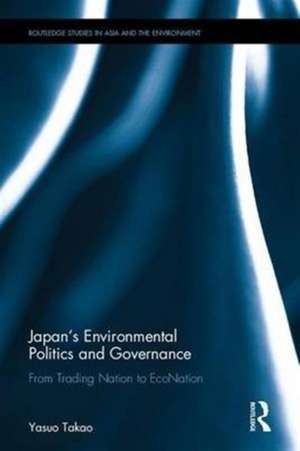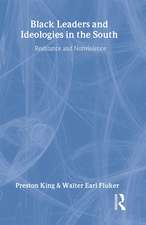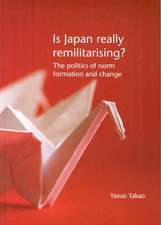Japan’s Environmental Politics and Governance: From Trading Nation to EcoNation: Routledge Studies in Asia and the Environment
Autor Yasuo Takaoen Limba Engleză Hardback – 18 oct 2016
This book investigates the emerging actors and new channels of Japan’s environmental governance which has been taking shape within an increasingly globalized international system. By analysing this important new phenomenon, it sheds light on the changing nature of Japan’s environmental policy and politics, and shows how the links between global strategies, national mandates and local action serve as an influential factor in Japan’s changing structures of environmental governance. Further, it demonstrates that decision-making competencies are shared between actors operating at different levels and in new spheres of authority, resulting from collaboration between state and non-state actors. It highlights a number of the problems, challenges, and critiques of the actors in environmental governance, as well as raising new empirical and theoretical puzzles for the future study of governance over environmental and global issues. Finally, it concludes that changes in the tiers and new spheres of authority are leading the nation towards an environmentally stable future positioned within socio-economic and political constraints.
Demonstrating that bridging policy gaps between local action, national policy and global strategies is potentially a way of reinventing environmental policy, this book will be of interest to students and scholars of Environmental Studies, Environmental Politics and Japanese Politics.
Preț: 850.99 lei
Preț vechi: 1142.37 lei
-26% Nou
Puncte Express: 1276
Preț estimativ în valută:
162.83€ • 170.47$ • 134.74£
162.83€ • 170.47$ • 134.74£
Carte tipărită la comandă
Livrare economică 07-21 aprilie
Preluare comenzi: 021 569.72.76
Specificații
ISBN-13: 9781138855908
ISBN-10: 1138855901
Pagini: 354
Ilustrații: 8
Dimensiuni: 156 x 234 x 26 mm
Greutate: 0.64 kg
Ediția:1
Editura: Taylor & Francis
Colecția Routledge
Seria Routledge Studies in Asia and the Environment
Locul publicării:Oxford, United Kingdom
ISBN-10: 1138855901
Pagini: 354
Ilustrații: 8
Dimensiuni: 156 x 234 x 26 mm
Greutate: 0.64 kg
Ediția:1
Editura: Taylor & Francis
Colecția Routledge
Seria Routledge Studies in Asia and the Environment
Locul publicării:Oxford, United Kingdom
Public țintă
Postgraduate and UndergraduateCuprins
Introduction
1. The Transformation of Japan’s Environmental Policy
2. The Rigidity of Japan’s Nuclear Energy Policy: State-Centric Gate-Keeping
3. The State of Local Capacity Building: Decentralized Policy Making
4. Tokyo’s Metropolitan Cap-and-Trade: Policy Learning and Diffusion
5. Shiga’s Cooperation with UNEP: Transnational Sectoral Network
6. Kitakyushu’s Environmental Business: Utility-Based Transnationalism within Norms
7. Yokohama’s Normative Commitment: Image and Reputation
8. Expert Citizens’ Role: Civic Science in Environmental Policy
Conclusion
1. The Transformation of Japan’s Environmental Policy
2. The Rigidity of Japan’s Nuclear Energy Policy: State-Centric Gate-Keeping
3. The State of Local Capacity Building: Decentralized Policy Making
4. Tokyo’s Metropolitan Cap-and-Trade: Policy Learning and Diffusion
5. Shiga’s Cooperation with UNEP: Transnational Sectoral Network
6. Kitakyushu’s Environmental Business: Utility-Based Transnationalism within Norms
7. Yokohama’s Normative Commitment: Image and Reputation
8. Expert Citizens’ Role: Civic Science in Environmental Policy
Conclusion
Notă biografică
Yasuo Takao is Senior Lecturer of Political Science in the Department of Social Sciences and Security Studies of Curtin University, Western Australia.
Descriere
This book investigates the emerging actors and new channels of Japan’s environmental governance which has been taking shape within an increasingly globalized international system. By analysing this important new phenomenon, it sheds light on the changing nature of Japan’s environmental policy and politics, and shows how the links between global strategies, national mandates and local action serve as an influential factor in Japan’s changing structures of environmental governance. Further, it demonstrates that decision-making competencies are shared between actors operating at different levels and in new spheres of authority, resulting from collaboration between state and non-state actors.






















